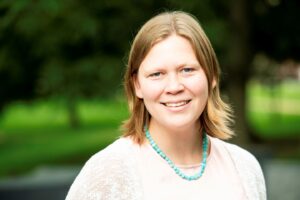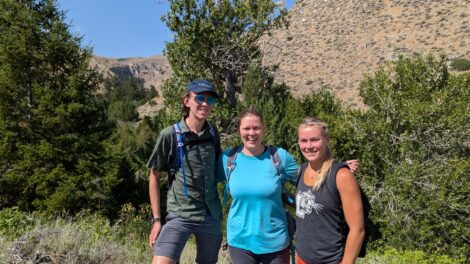Five-year $489,451 award will support Kelleher’s work and provide opportunities for students to engage in hands-on research
By Bryan Hay

Christa Kelleher ’08, assistant professor of civil and environmental engineering
Hydrologist Christa Kelleher ’08, assistant professor of civil and environmental engineering, has received a National Science Foundation Faculty Early Career Development Program (CAREER) award, the agency’s most prestigious recognition of early-career faculty.
The five-year $489,451 award, which starts March 15, will support Kelleher’s research documenting stream temperatures in the Delaware River watershed.
“The study will look at stream temperatures and help us understand why stream temperatures vary in different places,” she says. “Where is it colder? Where is it warmer, and why? And then, how does that change throughout the year?
“I’ve done a lot of work on stream temperatures on broad spatial scales,” Kelleher adds. “My master’s project when I first started research at Penn State after finishing up at Lafayette focused on Pennsylvania stream temperature. To receive a grant to continue this work many years later feels like I’ve come full circle. That’s really cool.”
The research, involving installing new sensors in the Delaware River basin will have important implications for aquatic and riverine habitat, hydrology, and human recreation, which are affected by water temperatures, she notes.
“Water temperature can help us trace hydrological processes, and it also matters for all sorts of aquatic life that live in our rivers and streams,” Kelleher says. “I drive to work along the Bushkill Creek and, starting about March, every morning there are people out there fishing. This is a river recreation centric area. People like to be in and around rivers. Stream temperature tells us a lot about what’s happening upstream or up gradient in the landscape. It can tell us about human activity. It can tell us about overall ecosystem health.”
The NSF CAREER grant “makes me feel like my research is recognized and valued by peers and that my engagement of undergraduate researchers is valued by my research community,” she says.
Student participation
Starting this summer, Kelleher and her students will start installing sensors and weather stations in streams in the Delaware watershed and take a first cut of data sets to see where water temperatures stand.
“The great thing about this grant is there’s actually parts of it that will be embedded into my courses,” she says. “But more than that, it gives me the flexibility to have a team of students from various disciplines who are working together, and I see that as really powerful.
“They can go out and do fieldwork together and with me, and they can learn from each other,” Kelleher adds. “It gives me the flexibility to bring together all kinds of students and involve them in classes, involve them in research, or involve them in honors theses.”
Community engagement
The grant will also allow Kelleher to partner closely with the Nurture Nature Center, 518 Northampton St., Easton.
“They’re doing such cool work. There will hopefully be public outreach events that will involve Lafayette and the Nurture Nature Center,” she says. “My goal is to also get a bunch of students down there to connect with Nurture Nature Center experts and expand the knowledge that already exists in our community.”
A Lafayette legacy
Kelleher remembers traveling to Africa on an NSF-funded trip with Roger Ruggles, associate professor emeritus of civil and environmental engineering, and learning about wetlands and water quality there.
“There was, of course, the academic learning, but also just understanding a new culture and understanding a new place,” she recalls.
“To be able to give that same opportunity to new students, that’s what research is all about,” Kelleher shares. “How do we learn about a place and not just the methods and the nitty gritty of the data analysis? What does our world look like? How do the things we as humans do in and along rivers impact what’s happening to water quality in these areas? Making some of those connections is really valuable.”


